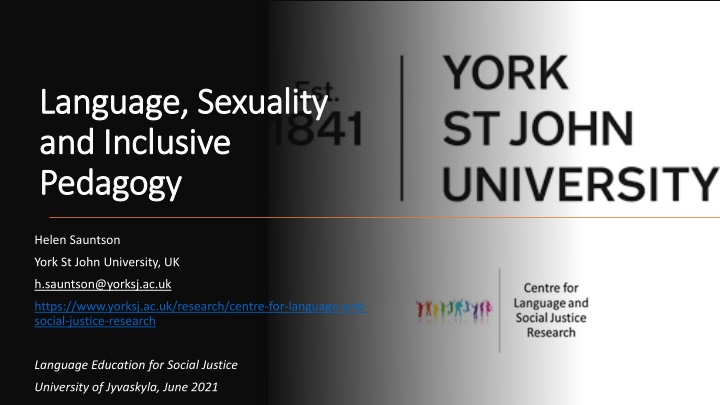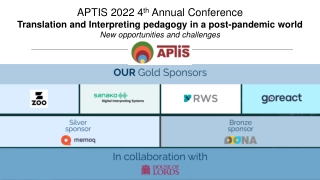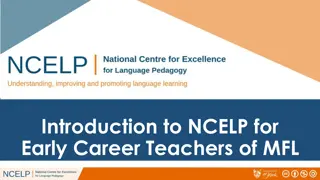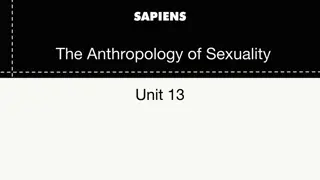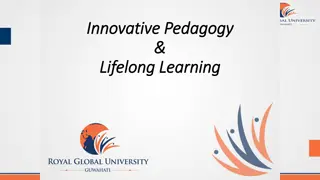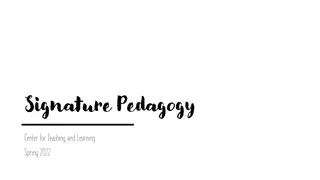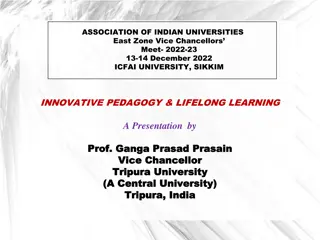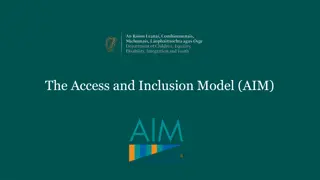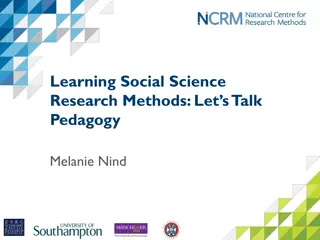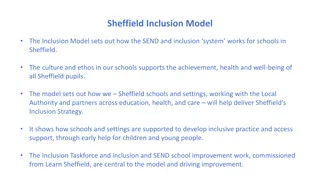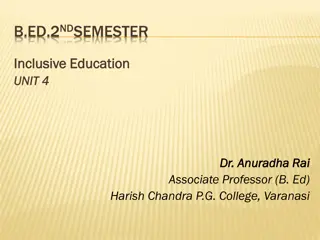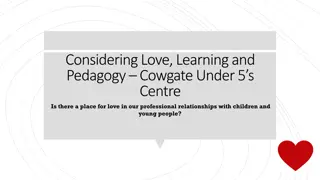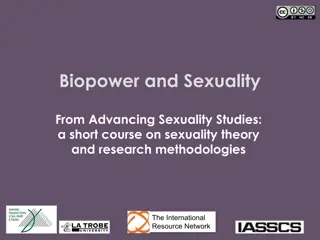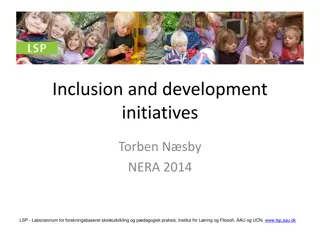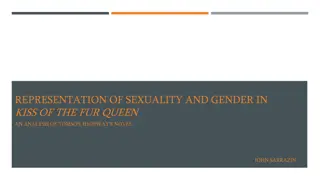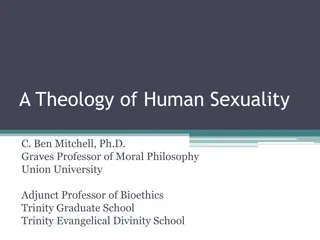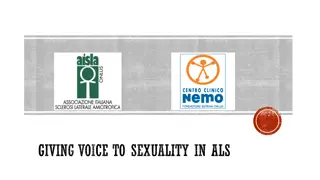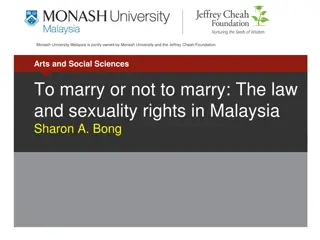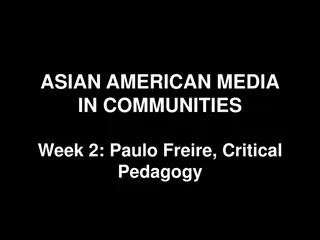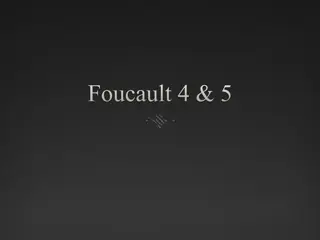Language, Sexuality, Inclusive Pedagogy and Educational Inclusion
This research delves into the intersection of language, sexuality, inclusive pedagogy, and educational inclusion, highlighting the importance of linguistic perspectives in promoting social justice and equality within educational settings. Through a queer linguistics lens, the study explores how language practices in schools impact discourses of gender and sexuality, emphasizing the need for inclusive language education and addressing linguistic injustices related to gender, sexuality, and social dimensions.
Download Presentation

Please find below an Image/Link to download the presentation.
The content on the website is provided AS IS for your information and personal use only. It may not be sold, licensed, or shared on other websites without obtaining consent from the author.If you encounter any issues during the download, it is possible that the publisher has removed the file from their server.
You are allowed to download the files provided on this website for personal or commercial use, subject to the condition that they are used lawfully. All files are the property of their respective owners.
The content on the website is provided AS IS for your information and personal use only. It may not be sold, licensed, or shared on other websites without obtaining consent from the author.
E N D
Presentation Transcript
Language, Sexuality Language, Sexuality and Inclusive and Inclusive Pedagogy Pedagogy Helen Sauntson York St John University, UK h.sauntson@yorksj.ac.uk https://www.yorksj.ac.uk/research/centre-for-language-and- social-justice-research Language Education for Social Justice University of Jyvaskyla, June 2021
Language and inclusion in education Motschenbacher (2011; 2016) need for greater examination of concepts of social justice and inclusion from a linguistic perspective. Linguistic research - well-placed to offer insights into how to develop and implement sexuality-inclusive language education. Linguistic injustices are not just about language they also relate to social dimensions such as gender and sexuality.
Language, sexuality and educational inclusion Language and sexuality in educational contexts key areas of research: 1. ESL classrooms and foreign and second language education (e.g. Ellwood, 2006; Liddicoat, 2009; Nelson, 2006; 2012; O Mochain, 2006; Paiz, 2020; Paiz and Coda, forthcoming) 2. Foreign language textbooks and other learning materials (e.g. Goldstein, 2015; Gray, 2013; Pakula et al, 2015; Pawelczyk and Pakula, 2015; Sunderland, 2015) 3. Language and production of sexuality and in/exclusionary discourses in UK schools (Sauntson, 2018a; 2018b, 2019)
Queer linguistics Useful for examining how normative and non-normative constructions of gender and sexual identity are inscribed in specific language practices in schools, and how these language practices may effect particular discourses of gender and sexuality. Can use different linguistic analytical frameworks within an overarching queer linguistics approach to examine how heterosexuality is naturalised through language and how other forms of sexual and gender identity are queered Motschenbacher (2011) and Motschenbacher & Stegu (2013) queer linguistics lends itself well to an eclectic combination of linguistic analytical frameworks in order to provide mutually qualifying positions.
Data and methods of analysis Data and methods of analysis Interviews (x 20) with LGBT+-identified young people (aged 13-25) who attend or have recently attended schools and colleges in two UK cities Appraisal analysis (Martin, 2000; Martin & White, 2005) used within overarching queer linguistic approach
APPRAISAL analysis APPRAISAL provides a systematic framework for analysing and describing evaluative language and categorising the ways that feelings, emotions, attitudes, social relationships and experiences are encoded in language. APPRAISAL is used to explore how language embodies the young people s feelings, attitudes and values towards sexual diversity and issues of inclusion and exclusion in schools, and how they perceive normative gender and sexualities to be constructed and reinforced in schools
Appraisal Overview APPRAISAL consists of the systems of: ATTITUDE GRADUATION ENGAGEMENT ATTITUDE = primary system through which people express emotions, judgements and values
3 subsystems of ATTITUDE AFFECT the linguistic resources deployed for construing the individual s emotional responses; JUDGEMENT the linguistic resources deployed for construing moral or social evaluations of behaviour; APPRECIATION the linguistic resources deployed for construing the aesthetic qualities of processes and natural phenomena. Each of the categories can have a positive or a negative value and the values work on a sliding scale of GRADUATION. APPRAISAL markers are realised primarily through the lexico-grammar of a text.
Attitude examples AFFECT: it s sort of discomforting when they re saying you have sex with a woman and that s the end of it (INSECURITY) over the summer I d been feeling really bad (UNHAPPINESS) JUDGEMENT: they don t really get that it s part of their job (-CAPACITY) I didn t say anything to any of the teachers (-VERACITY) APPRECIATION: this kind of was a positive story (+VALUATION) it s just a waste of effort and money and stuff and we re not actually learning what we need to learn (-VALUATION)
AFFECT: Sub-categories Positive AFFECT Negative AFFECT INCLINATION (expresses feelings of desire) DISINCLINATION (expresses feelings of fear) HAPPINESS (expresses feelings of cheerfulness and affection) UNHAPPINESS (expresses feelings of misery and antipathy) SECURITY (expresses feelings of confidence and trust) INSECURITY (expresses feelings of disquiet and surprise) SATISFACTION (expresses feelings of interest and admiration) DISSATISFACTION (expresses feelings of ennui and displeasure)
Analysis: AFFECT examples (UNHAPPINESS - Self) Ashley: I ve always had sort of really terrible anxiety and depression and gradually feelings got worse and worse Fay: I hated school I used to do whatever I wanted to get away from it was that bad Josh: screaming on the inside like I'm not happy at this school I'm getting bullied Martin: I had loads of problems at school [ ] it was just awful for me
Analysis: AFFECT examples (INSECURITY - Self) Amy: it probably didn t help that I wasn't comfortable with the label either Ashley: there was a dress code and I had to abide by that and all of that made me feel very uncomfortable Ashley: it would be just very confrontational in a way that sort of made me very anxious gave me sort of panic attacks John: I got that all the time as well as the dirty looks that make you feel uncomfortable Josh: it's just sort of discomforting when they re saying when you have sex with a woman and that's the end of it Abby: I remember this relationship I had with this one girl and like I was terrified she d like use it if we d fall out I don t know why it d bother me but if we d fall out she d be like I m going to tell everyone and stuff I would be absolutely terrified I would like have nightmares I wouldn t be able to sleep for weeks
Analysis: AFFECT examples (SECURITY - Self) Ashford: my teacher that I trust the most that I went to about being trans he is one of the most progressive people in the entire school Tad: luckily I had in the school which I was being bullied in a teacher who was gay and she worked with physical education and she made it more comfortable for me to even be in that environment in fact she did something really remarkable as I was so uncomfortable with the boys in their changing room [ ] I was removed from PE but I wanted to join in with something different I loved hanging around with girls then because that's when I felt more comfortable
Analysis: AFFECT examples (others) Fay: there could be kids out there like I like this what does that make me something like that if they re like struggling (UNHAPPINESS) to know who they are Jack: there's seven people in that class that are thinking oh shit (INSECURITY) right now Dan: the only trans we have in the school which is quite I ve talked to him and he was like saying he found it really hard (UNHAPPINESS) when he came cos he was the only one and he found it really hard (UNHAPPINESS)
Analysis: AFFECT examples (others) Hannah: I think a lot of teachers are scared (INSECURITY) to bring it up Josh: Miss was very shocked (INSECURITY) when I wrote about a gay teen suicide of Jamie Rodemeyer
JUDGEMENT Social esteem Assesses institutions, individuals and behaviours in terms of their: NORMALITY (how usual/unusual they are), CAPACITY (how capable they are) and TENACITY (how determined or resolute they are). Social esteem markers provide evaluations of how behaviour conforms or does not conform to socially desirable standards. Social sanction Assesses institutions, individuals and behaviours VERACITY (how truthful they are) and PROPRIETY (how ethical they are) and provides evaluative markers which indicate whether a behaviour is seen as right or wrong. (Based on Martin, 2000)
Analysis: JUDGEMENT (evaluation of own behaviour)
Analysis: JUDGEMENT examples (VERACITY Self) Amy: you don t wanna say that to anybody so it was keep it quiet it ll go away keep it quiet it ll go away ( VERACITY) kind of a feeling for me [ ] if I just carry on and just keep doing my work and stop playing football and say yea I like that boy in the magazine try and conform ( VERACITY) that it ll all be just go away Ashley: I came out in secondary school I was very open (+VERACITY) about being trans I came out about 16 so both the school and pretty much all of the students knew about it (+VERACITY) Jack: I didn t come out ( VERACITY) at school just because it was quite homophobic and well especially in a Catholic school when it's always depicted as being wrong in RE and stuff so I weren t willing to do it so I kept it to myself ( VERACITY) Stephen: I kind of came out (+VERACITY) slowly to my teachers like I told my SEN worker then they had a meeting with all the staff Abby: I m still not out ( VERACITY) in that area because it's just not spoken about
Analysis: JUDGEMENT examples (CAPACITY self) Fay: I didn t know ( CAPACITY) what a lesbian was I only thought there was gays and bis I didn t even know ( CAPACITY) there was a lesbian until I met that guy he told me about lesbians and transsexuals and hermaphrodites and loads of other areas but until I met him I didn t know ( CAPACITY) Jack: when I was young I was thinking I m never gonna be able to ( CAPACITY) come out just couldn t ( CAPACITY) get on with my life just be pretending
Analysis: JUDGEMENT examples (NORMALITY and PROPRIETY self) Fay: I ve had comments about being a dyke being a weirdo being a freak ( NORMALITY) John: I wasn t like out or anything like that but I still got like you poof and all crap like that ( NORMALITY) Josh: I ve moved nearly every single time because of bullying just like being the odd one out never really fit in ( NORMALITY) Abby: the girls didn t have to wear ties and they wore like the feminine v tops which I hated but we weren t allowed to wear ties ( PROPRIETY) until the last year because it was you know in a grammar school it's like boys and girls there's no in between or anything Nicky: it's almost like if you re the first one to come out and be gay or dress differently you re the one that's going to be made an example of ( PROPRIETY) [ ] it's like being gay and kind of like dressing gay is on another level so you don t wanna kind of bring attention to yourself
Analysis: JUDGEMENT (evaluation of others behaviour)
Analysis: JUDGEMENT examples (PROPRIETY - others) Ashford: the entire class is just really transphobic ( PROPRIETY) and it's just not a very nice atmosphere and the teachers almost laugh along with it ( PROPRIETY) Ashley: no one has really said anything awful to me about my gender or sexuality everyone's been kind of accepting (+PROPRIETY) Carl: every time we had an assembly if there was an award ceremony and he had to go up and get a certificate or anything they d all shout out hide your arse or watch your arse something like that ( PROPRIETY) Fay: they like treated me with respect (+PROPRIETY) they didn t treat me like I was different Nicky: there was an out lesbian couple and as soon as everyone found out about them people refused to get changed in the same changing room at PE and no teacher ever did anything about it ( PROPRIETY) Stephen: my English teacher's like she's really supportive of it and she's always on about treating people equally no matter what the sexuality or what the sexual identity is (+PROPRIETY) Ashley: the first person I came out to at school was a teacher and was the head of the English department [ ] he was completely accepting of it (+PROPRIETY) I sort of came to him in a distraught mess and he was just great (+PROPRIETY)
Analysis: JUDGEMENT examples (-CAPACITY others) Ashford: they were talking about friends and relationships and all that in French and in his paragraph he put down boyfriend and he keeps doing it to see how many times it's corrected to girlfriend and right now it's been seven times he's been corrected from boyfriend to girlfriend in French Jason: I actually think it's been quite poorly handled ( CAPACITY) in my experience they never really sit you down and talk to you about it they sort of just push it aside and sweep it under the mat ( CAPACITY) Ruby: schools just like it's not really their problem it's like something personal that they have to deal with and they don t really get that it's part of their job ( CAPACITY) it's like literally your job Stephen: teachers have to be better educated ( CAPACITY) Nicky: I just go back to they need to be educated better ( CAPACITY)
Analysis: JUDGEMENT examples (-VERACITY others) Alex: didn t even mention it ( VERACITY) anything like that John: when I was at school it was never spoke about ( VERACITY) Jason: that's all just like shoved under the carpet and ignored ( VERACITY) Todd: they were silent on it they didn t really talk about it ( VERACITY)
APPRECIATION (from Martin, 2000) Positive Negative Reaction: Impact arresting, captivating, engaging... dull, boring, tedious, staid... Did it grab me? fascinating, exciting, moving... dry, ascetic, uninviting... Reaction: Quality lovely, beautiful, splendid... plain, ugly... Did I like it? appealing, enchanting, welcome... repulsive, revolting... Composition: Balance balanced, harmonious, unified... unbalanced, discordant... Did it hang together? symmetrical, proportional... contorted, distorted... Composition: Complexity simple, elegant... ornamental, extravagant... Was it hard to follow? intricate, rich, detailed, precise... monolithic, simplistic... Valuation challenging, profound, deep... shallow, insignificant... Was it worthwhile? innovative, original, unique... conservative, reactionary...
+Valuation (facilitators of inclusion) -Valuation (barriers to inclusion) English Sex and Relationships Education Being involved in women s and/or LGBT organisations School s treatment of homophobic bullies Analysis: APPRECIATION Books with gay characters Physical Education Drama Playground Discussions about LGBT identities, relationships and issues School s handling of gender issues/gender segregation Music Exams Art School uniform policy Items ascribed positive and negative VALUATION
APPRECIATION: Examples (-VALUATION) Alex: I don t think there was any positive ( VALUATION) in my school it's just nothing it was mostly negative ( VALUATION) Hannah: I just don t think there was any support at all ( VALUATION) in our school Martin: overall I think it [school bullying policy] was ineffective ( VALUATION) Ashford: another thing that schools need to change is segregating or like putting people in different things because of their gender ( VALUATION) [ ] girls changing room right next to it they re on completely different sides of the school and even our PE lessons are quite often segregated which is ridiculous ( VALUATION)
APPRECIATION: Examples (+VALUATION) Amy: I think English is perhaps the best subject (+VALUATION) to introduce it through [ ] it's a good way of maybe celebrating differences so I think it d be a perfect subject (+VALUATION) Carl: when I done Drama that was okay that was good (+VALUATION) I had a nice teacher
Summary of key findings Participants experience more exclusion than inclusion Teachers seen as being at the heart of inclusive pedagogy around sexuality and gender diversity. Seen to have capacity to create inclusive or exclusionary learning environments in relation to gender and sexual diversity. Teachers thus play an important role as guardians of inclusive language policies, as shapers of communicative norms in the classroom community and as agents of change more generally. (Motschenbacher, 2011: 180) The subject of English emerges as having transformative potential and is recognised by participants as a key site for establishing and developing socially just and inclusive pedagogy in relation to gender and sexual diversity.
Need issues of language, sexuality and inclusion to form an integral part of teachers pre-service and in-service training School inclusion policies need to contain focus on language issues (which consider linguistic silence as well as linguistic presence) English teachers play particularly important role in gender and sexual diversity training in schools Implications and ways forward
References Ellwood, C. (2006) On coming out and coming undone: Sexualities and reflexivities in language education research. Journal of Language, Identity, and Education 5 (1): 67-84. Goldstein, B. (2015) LGBT invisibility in language learning materials. Seminar 5 of Queering ESOL: Towards A Cultural Politics of LGBT Issues in the ESOL Classroom. Gray, J. (ed) (2013) Critical Perspectives on Language Learning Materials. Basingstoke: Palgrave. Leap, W. (2020) Language Before Stonewall: Language, Sexuality, History. Basingstoke: Palgrave. Liddicoat, A. (2009) Sexual identity as linguistic failure: Trajectories of interaction in the heteronormative language classroom. Journal of Language, Identity and Education 8 (2/3): 191-202. Martin, J. (2000) Beyond exchange: APPRAISAL systems in English. In S. Hunston and G. Thompson (eds) Evaluation in Text: Authorial Stance and the Construction of Discourse. Oxford: Oxford University Press. 142-175. Martin, J. and White, P. (2005) The Language of Evaluation: Appraisal in English. Basingstoke: Palgrave. Motschenbacher, H. (2011) Taking queer linguistics further: Sociolinguistics and critical heteronormativity research. International Journal of the Sociology of Language 212: 149-79. Motschenbacher, H. (2016) Inclusion and foreign language education. International Journal of Applied Linguistics 167 (2): 159-189. Motschenbacher, H. and Stegu, M. (2013) Queer linguistic approaches to discourse: Introduction. Discourse and Society 24 (5): 519-35. Nelson, C. (2006) Queer inquiry in language education. Journal of Language, Identity and Education 5 (1): 51-66.
References Nelson, C. (2012) Emerging queer epistemologies in studies of gay -student discourses. Journal of Language and Sexuality 1 (1): 79-105. O Mochain, R. (2006) Discussing gender and sexuality in a context-appropriate way: Queer narratives in an EFL college classroom in Japan. Journal of Language, Identity and Education 5 (1): 51-66. Paiz, J. (2020) Queering the English Language Classroom: A Practical Guide for Teachers. London: Equinox. Paiz, J. and Coda, J. (eds) (Forthcoming) Intersectional Perspectives on LGBTQ+ Issues in Modern Language Teaching and Learning. Basingstoke: Palgrave. Pakula, L., Pawelczyk, J. and Sunderland, J. (2015) Gender and Sexuality in English Language Education: Focus on Poland. London: British Council. Pawelczyk, J. & Pakula, L. (2015) Constructing gender and sexuality in the EFL classroom in Poland: Textbook construction and classroom negotiation? In A. Mustapha & S. Mills (eds) Gender Representation in Learning Materials: International Perspectives. London: Routledge. 193- 211. Sauntson, H. (2018a) Language, Sexuality and Education. Cambridge: Cambridge University Press. Sauntson, H. (2018b) Language, sexuality and inclusive pedagogy. Special issue on Linguistic dimensions of inclusion in foreign language education . International Journal of Applied Linguistics. Sauntson, H. (2019) Challenging gender- and sexuality-based discrimination in UK schools: Young women s experiences of illegitimation and resistance. In J.I Kjaran and H. Sauntson (eds) Schools as Queer Transformative Spaces: Global Narratives on Sexualities and Genders. London: Routledge. Sunderland, J. (2015) Gender (representation) in foreign language textbooks: Avoiding pitfalls and moving on. In S. Mustapha & S. Mills (eds) Gender Representations in Learning Materials: International Perspectives. London: Routledge. 19-34.
